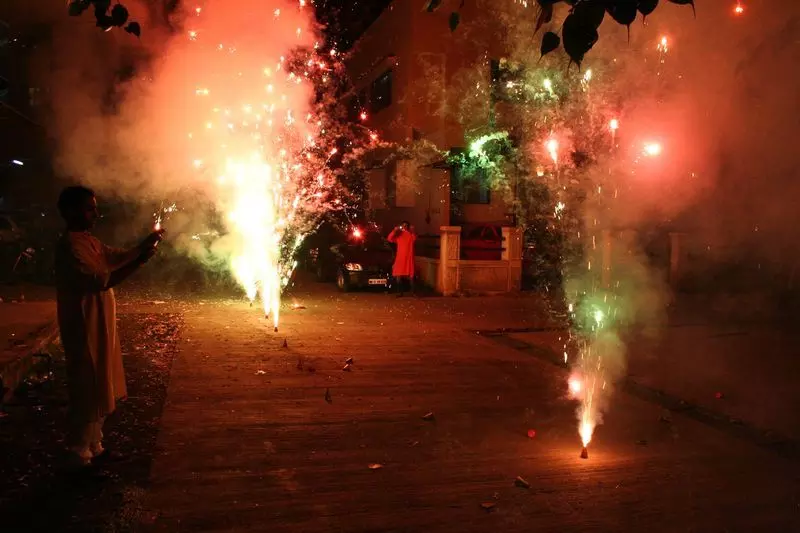Day after Diwali: Pollution spike chokes cities, hospitals see surge in respiratory cases
Inhalation of cold, polluted air causes the muscles in the airway to constrict, leading to coughing, wheezing and shortness of breath
By - Anoushka Caroline Williams |
Day after Diwali: Pollution spike chokes cities, hospitals see surge in respiratory cases
Hyderabad: As the night sky bursts into colour every Diwali, the air fills not just with celebration, but with smoke dense enough to choke entire neighbourhoods.
By the next morning, many wake up coughing, congested and short of breath. Hospitals, too, begin to fill up, not with firework injuries, but with patients gasping for cleaner air.
Doctors say it’s a pattern that repeats every year.
Firecrackers spike air pollution levels overnight, and the onset of colder weather traps these pollutants close to the ground. The result: a sharp increase in chest congestion, coughing, wheezing, and flare-ups of asthma or bronchitis across major Indian cities.
The science behind the smoke
Firecrackers release a toxic cocktail of pollutants, fine particulate matter (PM2.5), heavy metals like barium and strontium that give fireworks their colours, and gases such as sulfur dioxide and nitrogen oxides.
These particles are small enough to travel deep into the lungs, where they irritate the lining of the airways and inflame lung tissue.
“The human airway is like a tree; once its smallest branches get coated with these fine particles, air exchange becomes difficult,” explained Dr S Ramesh, senior pulmonologist speaking to NewsMeter. “People describe it as a heaviness in the chest or a constant need to clear their throat. Even healthy individuals can feel the effects, but for those with asthma or COPD, it can be dangerous.”
Cold air adds another layer of risk.
As temperatures drop and humidity levels fall, the airway lining becomes dry and hypersensitive. Inhalation of cold, polluted air causes the muscles in the airway to constrict, leading to coughing, wheezing and shortness of breath.
The pattern in hospitals
Within 24 to 48 hours after Diwali night, hospitals across metro cities see a visible spike in respiratory cases. Outpatient departments report queues of coughing patients, while emergency wards prepare nebulisers and oxygen cylinders.
“We start getting calls from 6 am the next morning,” says Dr Meenal Kapoor, consultant pulmonologist.
“Patients come with severe coughing fits, throat irritation, and chest tightness. Some are first-timers who have never had breathing issues before. Others are known asthmatics or elderly people whose symptoms suddenly worsen.”
According to her, even short exposure to cracker smoke can trigger inflammation that lasts for several days. “We see small children with persistent coughs and older adults with wheezing that doesn’t go away for a week or more,” she adds. “The combination of smoke and cold air aggravates it further.”
What doctors ask and what they recommend
Pulmonologists first ask when the symptoms began, how long the cough lasts, and whether it worsens outdoors or at night. They also check for fever, sputum production, or breathlessness, signs that an infection may have set in.
“Many people assume it’s just the weather, but prolonged exposure to pollutants lowers immunity,” says Dr Ramesh. “Even a mild viral infection can turn into bronchitis in such conditions.”
Doctors advise patients to monitor their symptoms closely and avoid self-medicating with antibiotics or cough syrups. Instead, hydration, steam inhalation, saline nasal sprays, and prescribed bronchodilators (if needed) help relieve congestion.
Those with pre-existing conditions are asked to strictly adhere to inhaler use and maintain a written action plan for flare-ups. Vaccinations against flu, pneumonia, and Covid-19, are also recommended during this season to reduce the risk of respiratory infections.
Steps to protect your lungs this season
1. Limit outdoor exposure:
Avoid stepping out during or immediately after fireworks. Check the Air Quality Index (AQI) and stay indoors when it’s “unhealthy” or “very unhealthy.”
2. Use proper masks:
N95 or KN95 masks filter fine particulate matter effectively. Cloth or surgical masks are not sufficient against PM2.5 particles.
3. Keep homes clean and sealed:
Shut windows during peak smoke hours and open them when the air clears. Consider using air purifiers with HEPA filters, especially for children and the elderly.
4. Stay hydrated and warm:
Warm fluids, soups and steam inhalation help loosen mucus. Avoid cold air exposure, wear scarves that cover the mouth and nose to warm the air before inhalation.
5. Protect children and elders:
Keep infants and older adults indoors during celebrations. Avoid morning walks in heavy smog or fog.
6. Avoid indoor smoke:
Do not light incense, candles or diyas excessively indoors during high-smoke days; ventilation matters.
When to seek urgent care
Doctors caution against ignoring prolonged coughing or breathlessness. Immediate medical help is needed if:
• There is wheezing that doesn’t respond to inhalers
• Breathing becomes laboured or painful
• The lips or fingers turn bluish
• High fever or chest pain develops
“These symptoms could signal a severe asthma attack, bronchospasm, or even pneumonia,” says Dr Kapoor. “Prompt treatment can prevent serious complications.”
A message for city residents
Pulmonologists stress that awareness, not alarm, is key.
“Fireworks last a night, but their effects can linger in your lungs for days,” says Dr Ramesh. “We’re not asking people to give up tradition, only to celebrate responsibly. The air we breathe after Diwali is shared by everyone, from a newborn to an asthmatic senior.”
As the winter chill sets in and the smoke hangs low over cities, doctors advise small but consistent precautions: check the AQI, use your mask, keep medications handy, and stay hydrated. The light of celebration should never come at the cost of your breath.